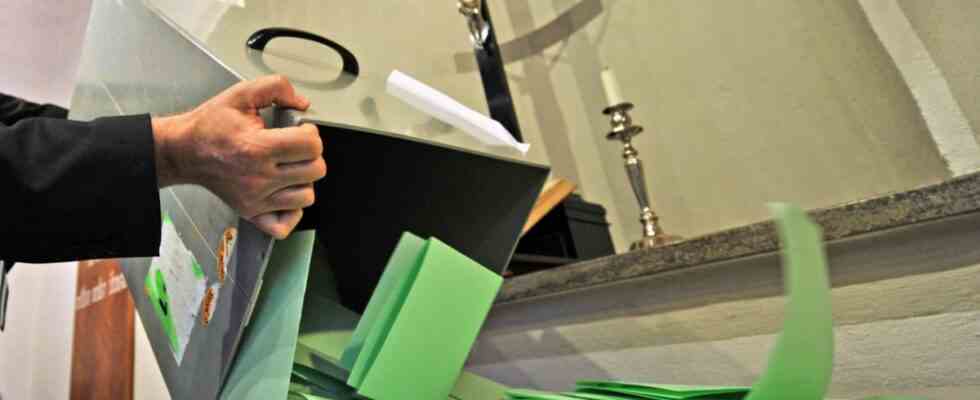Richard Weiser is 65 years old and has been retired for a year. He took pity on me again. “I’ll do it one more time now, then no more.” Weiser is the fourth out of four. With the best will in the world, no more applicants were found for the election to the parish council in St. Johannes Evangelist am Lerchenauer See. On March 20, the lay representation in all Catholic communities in Bavaria will be elected for four years.
Of the 115 parishes in the city of Munich, St. Johannes Evangelist am Lerchenauer See is one of the younger and now also one of the smaller ones. The church with its strict, functional architecture was inaugurated in 1968 and blended in perfectly with the neighborhood of newly built apartment blocks that had just been placed on the fields in the north of the city for ten thousand people. “In 1968 there were 7,500 members of the community, today there are just under 1,800,” counts Weiser. The fact that the search for a candidate for the parish council is difficult is not due to the shock that the abuse report for the Archdiocese of Munich and Freising published in January triggered among the faithful.
This shock could have been particularly strong in St. John Evangelist. Here in the early 1980s was the first place of action in the archdiocese of the pedophile priest Peter H., to whom the experts dedicated a special volume of 370 pages and who disappeared from the parish practically overnight after there were rumors that there was “something going on with children been”. There are only a few people who were there back then, says Weiser. “I was startled myself that it was with us, I didn’t know that before.”
The publication was nevertheless the reason “why we presented the prevention officers so clearly on our homepage”. In the search for candidates for the parish council, however, the report played no role at all. Rather, it is so difficult because “many people have moved away from the neighborhood and now many people with a different faith from a migrant background live here.” In addition, according to the 65-year-old, many would have said: I’d be happy to help with a single project, but I don’t want to commit myself to a committee for four years. The professional requirements are now so high and in expensive Munich both partners often work that there is less time for voluntary work.
Hiltrud Beauty is chairwoman of the Catholic Council and parish councilor in St. Leonhard.
(Photo: Toni Heigl)
This was also the experience of Hiltrud Beauty, Chairwoman of the Catholic Council for the Munich region and a parish councilor in St. Leonhard in the Menzing parish association for eight years. “It is not apparent that the abuse report played a role in the search for a candidate.” Because the people who are at stake here have long followed “what was going on in church politics, and then they are also shaken and shocked at the moment, but basically it wasn’t a big surprise either.”
For some time now, however, there has been a trend that there are fewer and fewer volunteers who are willing to commit themselves over a longer period of time. Church work does not differ from that in associations or politics. But what is striking about beauty is that the search for volunteers is particularly difficult when there is a crunch between the parish and the pastor. “In the last election period, there were parishes that didn’t have a parish council at all due to a lack of candidates. Very few. But there were.” The neighbors of Maria Schutz in Pasing, for example. “But they’ve had a new pastor for some time, who gets along very well with the people and hey presto, there’s a bunch of candidates.”
Beauty’s own parish association with 12,700 Christians is located at the comparatively wealthy interface between Obermenzing and Pasing, “rather homogeneous”, tending to be a commuter belt. “A good cooperation between full-time and volunteers,” says the 61-year-old lawyer. For the parish association seat in the parish of Leiden Christ there are 16 applicants for 15 places. St. Leonhard lags behind with eight applicants for nine places.
Julius Wiesner is a candidate for parish council in St. Ursula in Schwabing, although he does not live there.
(Photo: private)
In the urban parish association of Altschwabing, to which St. Ursula and St. Sylvester belong, on the other hand, they stand in line. “From 2018 to 2022 we even worked with expanded parish councils, twelve for St. Sylvester and 14 for St. Ursula, about twice as many as there are places available,” says Benedikt Breil, 22, parish council in St. Ursula and board member Association of German Catholic Youth in the Munich Region. “Interestingly, many are between 20 and 40 years old.”
Like Julius Wiesner, he belongs to the now-first-right faction. The 33-year-old is running for the first time. The management consultant chose St. Ursula after a tour of Munich parishes because the parish is “liberal and cosmopolitan, takes a clear stance and positions itself against abuse and abuses. From the pulpit down and in the parish.” Wiesner doesn’t live in the district at all, but it is possible to apply to run for office or vote in another district.
Some people around him reacted to his candidacy in these times with alienation and critical questions. “I can understand that and the latest report is probably not the end of the road either.” But he sees an opportunity for change right now. Also promoted “due to massively collapsing income at the church in the next few years”. This opens a window for redesign, accompanied by the reform movement of the synodal path. “That is my hope.”

